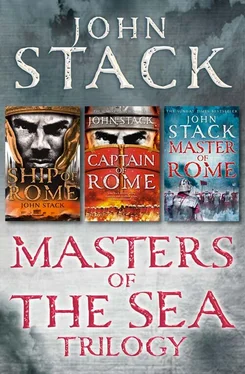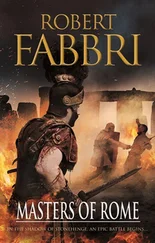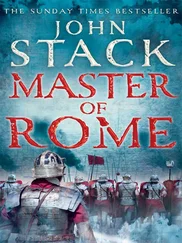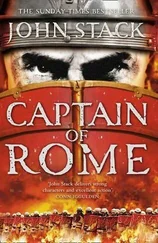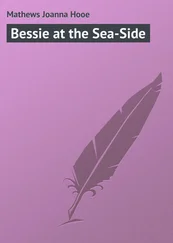The frantic pleas of the Romans were cut off as the Melqart struck, many of the archers on the aft-deck running to the stern rail, hoping for survivors. There were none. Hamilcar found himself watching Gisco as the admiral stared at the broken bodies of the Romans in the wake of his ship. He marvelled at the duality of the commander. He was an incredible seaman, the perfection of his trap and his ability to understand and outwit the Roman enemy testament to his skill. But he was also capable of incredible brutality, a burning, insatiable blood lust that demanded a heavy price from the enemy.
Hamilcar recalled the brief of his appointment, a shadow to extend the reach of the Council of Carthage to ensure there was no repeat of Gisco’s ignominious defeat at Agrigentum. It was a course that Hamilcar had often secretly questioned, wondering why Gisco had been allowed to retain his command. Only now, in the heat of battle, did he fully understand the Council’s logic. If Rome was to be defeated in Sicily, men with Gisco’s ruthlessness would be needed in every battle. In all its five-hundred-year history, Carthage had never relinquished a dominion to any enemy. Sicily could not become an exception.
Gisco turned as the Roman sailors slipped beneath the waves, immediately noticing Hamilcar’s gaze. The younger man continued to stare, a new commitment to forge a unified command welling up within him. Gisco noted the expression and mistook it for a shared satisfaction over the death of the helpless Roman sailors.
‘This will send a message to Rome and her legions,’ Gisco said, the fire of victory in his words. ‘From this moment, from this day, the seas belong to Carthage.’
Hamilcar nodded, bridging the gulf of honour between them with the common belief in their cause.
‘We have become messengers of Mot, the god of death. His message is: Death to the Romans.’
Hamilcar’s expression remained hard as he absorbed the words, the finality and the determination of the battle-hardened man before him. Gisco fought out of hatred for the enemy, Hamilcar because of his belief in Carthage. In the end their objective was the same, a connection forged as Hamilcar repeated Gisco’s vow.
‘Death to the Romans!’
The Aquila swept northwards through empty seas, her sail raised at the end of a long day, the slaves below deck resting at their posts, their bodies draped over the oars that defined their existence. Atticus stood on the aft-deck, staring out at the rapidly descending sun in the western sky. He was joined there by Septimus, the two men talking silently, their thoughts with the transport fleet lost over the horizon.
The sky was burnt red by the fading sun’s light, the sight a fitting backdrop to the day’s slaughter, as if the gods were accepting the souls of the dead, their passage to Elysium marked by the bloodstained sky. Atticus had watched the earlier battle for as long as possible, the details rapidly blurring as the Aquila escaped unopposed, until all that remained in view was a huge pall of black smoke. It was a sight that shamed him and the centurion who had stood beside him in silence.
The breeze was light in Atticus’s face as he turned away from the sunset to look out over the quiet deck of his ship. He had been on the aft-deck all day, over fourteen hours in total. Throughout the day his stamina had been fuelled by anger, by bitter frustration at his inability to wield the fearsome weapon under his feet in defence of his countrymen who were dying in their droves just beyond his reach. That stamina was now waning, the battle already becoming a single entity in his mind rather than a series of individual horrors.
Scipio had gone below as soon as the Aquila had secured her escape, Atticus noticing that the senior consul had never once looked back at the condemned fleet. He replayed in his mind his earlier confrontation with the consul and, although he realized his challenge to Scipio’s authority had been foolhardy, Atticus was also convinced his argument had been just and honourable. The thought of Scipio’s cold detachment from the fate of the transport fleet reignited Atticus’s latent anger and he cast aside his unease at the repercussions of challenging the consul’s order.
Atticus’s thoughts turned to the Punici. Their blockade had not been expected to materialize for weeks, but somehow they had located the Romans’ supply hub and had caught the Romans unawares, driving a wedge between Sicily and the mainland, a separation which spelled death for forty thousand Roman legionaries.
Atticus re-examined their trap, the sky darkening around him. It had been perfect, a true mark of their incredible seamanship. Coupled with this deadly skill, the Carthaginians, having built their empire on the back of their fleet, had scores of galleys in addition to the fifty Atticus had seen. Now, all that naval power was weighted against the dozen triremes of the Roman Republic; lighter smaller galleys designed for coastal patrol and skirmishing. The odds were insurmountable.
As the Aquila fled north, the first stars began to appear in the evening sky. Their arrival gave Gaius his first opportunity to accurately set the Aquila ’s heading, and Atticus felt the deck heel slightly under his feet as the adjustment was made. Their course was now firmly fixed for Rome.
Конец ознакомительного фрагмента.
Текст предоставлен ООО «ЛитРес».
Прочитайте эту книгу целиком, купив полную легальную версию на ЛитРес.
Безопасно оплатить книгу можно банковской картой Visa, MasterCard, Maestro, со счета мобильного телефона, с платежного терминала, в салоне МТС или Связной, через PayPal, WebMoney, Яндекс.Деньги, QIWI Кошелек, бонусными картами или другим удобным Вам способом.
